- Home
- T. Kingfisher
The Raven and the Reindeer Page 7
The Raven and the Reindeer Read online
Page 7
Gran Aischa picked her mug up, then set it down again untasted. “That’s a darker story than I made for you,” she said. “Much darker. It’s not one I’d tell often, and not in winter.”
Gerta bowed her head.
“How did you run afoul of that fell maid?”
“She took my friend,” said Gerta. “Stole him in the night. I saw them go, but I didn’t follow soon enough…”
Gran Aischa frowned. She got up then and went to the bar and poured herself out another drink. The smell of it, when she came back to the fire, was thin and raw and potent.
“Let him go,” she said.
“I’m sorry?”
“Your friend,” said Gran Aischa. “That’s a story with no happy ending. You’ve still got a chance at yours.” She drank deeply and grimaced. “Let him go. Find yourself a strapping lad who knows how to listen and will worship the ground you walk on. They’re rare, but they’re worth it.”
“But she kidnapped him!” said Gerta. “I can’t just abandon him!” She flushed with shame at the thought that she had done so for seven months already.
Gran Aischa shook her head. “She doesn’t take the unwilling. He had to climb into her sledge himself.”
“I’m sure she enchanted him somehow—he wouldn’t have—”
She had to stop then, remembering how Kay had always loved the snow and the cleanness of it, and how beautiful the Snow Queen looked. Yes. Perhaps he had climbed into the sledge himself.
“She’ll kill him,” she said.
Gran Aischa sighed. “Oh, eventually. She’ll give him kisses—and more than kisses—and all that ice will work its way to his heart. But he’ll never feel a thing.”
“I can’t let that happen!”
“Plenty of sweethearts die as children,” said the storyteller. “They fall through the ice or cross a pasture with a bull or catch a fever and die of it. It’s hard and there’s tears, but you shouldn’t throw your life away pining for them.” She smoothed her hair down. “Your sweetheart’s gone, same as if he’d died of a fever. Running after him won’t help.”
“Please,” said Gerta. “If you know anything…if there’s anything you can tell me…”
She dropped to her knees in front of the fire.
Gran Aischa sighed and looked down at Gerta. “You’re asking me to hand you the knife,” she said bitterly, “so you can go fall on it. I shouldn’t tell you anything. But you ask very prettily and I’m too old to stop foolish children any longer.”
She gestured impatiently to Gerta, who climbed back into her chair and perched on the edge, leaning far forward.
“That one,” said Gran Aischa. “That one lives farther north than north, and you won’t get there on a human road. You’ll need to find another way.” Her eyes rested on Mousebones for a moment. “Still, walking north with a raven on your shoulder is a good start. Keep your eyes closed and your heart open. The way will open, or it won’t. You’ll know if it doesn’t, if you come at last to the sea.”
She took another sip. “That one delights in the cold and oversees it. I knew an old Sámi woman—long and long ago it was. She might be dead now. She told me that one was not one of their spirits, but they knew of her, for all that they’re good Christians now.”
Gran Aischa frowned into her drink. “I’ve heard a great many stories about her, but you know that stories are not always true. Some say she was a human girl unlucky in love and it froze her heart, and now she searches the world for pretty boys to freeze in turn.” She shook her head. “I doubt that. The shape of her in my head is not human, and I’ve learned to trust such things. I think she was a spirit born of ice and she steals away human children. Cut from the same cloth as the Fair Folk, anyway.”
Gerta shook her head, puzzled.
“Creatures of the south,” said Gran Aischa. “They live a little outside the world and steal people from our world into theirs. When the plagues came so long ago, most of the people died, but I imagine the Fair Folk lived.” She took another drink. “I won’t get to the great port again in my lifetime, or I’d ask a trader there if they still put out milk for the fairies. I’d be surprised if they didn’t.” She leaned forward and poked a withered finger at Gerta. “Not like us. The tonttu were never as cruel as the Fair Folk.”
Gerta nodded politely. The old storyteller was rambling now, and Gerta wasn’t sure if there was much more sense to be gotten from her. Her grandmother had put out hot oatmeal for the tonttu, the spirits of the house and the sauna, but those little household magics were a long way from the Snow Queen.
“Stay the night,” said Gran Aischa abruptly, her eyes sharpening. “Stay and sleep well, and have a good meal. Go in the sauna and bake the sorrow out of your bones. It may be the last chance you get. And in the morning, when you walk north with your raven—well. If you walk all the way to Sápmi on this road, look for a woman named Livli. She used to live just over the border. She was old then and will be older now, but some women age like tree roots and last nearly forever.”
Gerta’s heart sank at the thought of walking clear to Sápmi—how far would that even be?
Still, for Kay. If I must walk to the end of the world, so be it. Sápmi is not so far, compared to that. And I will have a meal and not have to sleep under a hedge tonight.
“I would be glad to stay,” she said.
“If you do meet Livli,” said Gran Aischa, “tell her that your story is written on the hides of herring. She’ll find that funny.” She smiled herself, but it was sad, and did not quite touch her eyes.
Her dreams that night were quiet. She stayed in the sauna until she could not stop from yawning, and slept immediately.
The wooden floor and the long wooden ceiling beams had been an inn far longer than they had been trees. Their dreams were of polishing and dust motes and footsteps, and overwhelmingly of travelers sleeping. So Gerta slept and in her dreams she slept again, and she woke feeling strong and hungry.
Gran Aischa’s daughter fed her an enormous meal of spiced sausages and eggs and onions, and sent her on her way with a pack that groaned with food.
“What do I owe you?” asked Gerta, reaching for the small pouch of coins at her side.
“You don’t,” said the storyteller’s daughter. “My mother tells me that you are going to your death, and we don’t charge the dying for their last meals.”
Gerta blinked. On her shoulder, Mousebones shifted from foot to foot.
“Mother is not very tactful,” said the innkeeper, sighing. “But she sees a long way, when she can see at all. Be careful. You could stay here, you know. I can always use a hand around the inn.”
Gerta shook her head. “It’s very kind of you,” she said, “and I appreciate it. But I have to find Kay.”
“Then go with God,” said the storyteller’s daughter, “and whatever kindly spirits you meet along your path.”
CHAPTER SIXTEEN
She and Mousebones had been on the road for two days when the raven said “The other human girl I knew lives near here.”
Gerta felt a pang of something that wasn’t jealousy, but was at least a little like it. “Oh?” she said, keeping her voice carefully neutral.
“In the woods,” said Mousebones, gesturing toward the line of trees off to their left. “She lives there with her flock.”
Gerta’s first instinct, rapidly squelched, was to walk away from the forest.
That’s stupid. We’re friends, that’s all, and he’s allowed to have other friends.
She aimed her feet toward the trees. “Do you think she’ll let us stay for the night?”
“I stayed for weeks,” said Mousebones. “She healed up my wing and fed me dead mice.”
“…hopefully she’ll have something for humans to eat, too.”
It occurred to Gerta that Mousebones might prefer to spend the winter in the care of a healer who fed him dead mice. She felt an odd wash of cold from the center of her chest at the thought.
He’s not my
pet. If he wants to stay there, he can.
And if the thought of not having him around to hunger after my eyeballs makes me feel a bit like crying…well, that’s my problem, not his.
Aloud, she said only “It’ll be warmer there than it will be in a ditch, I’m sure.”
It took an hour to reach the trees, but she was glad that she had started in that direction. The sky was developing a certain grey heaviness that she didn’t like. It looked like more snow was on the way.
There was a clear gap in the trees. She made for it and found the remnants of a road.
Mousebones took off, winging awkwardly from tree to tree. Gerta bit her lip.
Don’t be stupid. He wouldn’t leave without saying goodbye.
And indeed, a few minutes later he returned, shaking snow down on her and cawing laughter.
“Hey! That’s cold!”
“Aurk!”
She tossed a snowball at him underhand, and he flew easily out of the way, snickering.
“You’re lucky you’ve got wings,” she said.
“Wings are the natural state of being,” he said. “You were just born unlucky.” He hopped onto a bough overhead. “The other human lives near here. Follow me.”
Gerta followed him. Pine needles crunched underfoot as she walked.
Don’t be so nervous. This is no different than a farmhouse, and you got used to going up to those. If you don’t like her, you can leave.
But would Mousebones come with me?
“Not far now—” called Mousebones, and then a large man stepped out from behind a tree and grabbed Gerta around the waist.
Gerta yelped. “Hey—hey!”
He was very large and red-faced, with stubble more yellow than grey. He looked at her for a moment with his brow knit, and then he bent his knees and heaved her into the air.
“Stop—!” Gerta began, and then he had her slung over his shoulder and was jogging through the forest.
She had never been slung over anyone’s shoulder before. It had very little to recommend it. Her head was hanging down and the ground was lurching past.
“Aurk!” she heard Mousebones calling. “Aurk! Stop that! Put my human down! You don’t carry other humans that way!”
She tried kicking her feet but could get no leverage. She elbowed him in the kidneys and he grunted, so she did it again, but he didn’t slow down.
The other problem with being carried like that became rapidly apparent. Every step slammed his shoulder into her gut, over and over. Things started to move, and not in a good way.
Gerta tried to get a hand over her mouth, but it wasn’t going to do any good, so then she just tried to get her hand out of the way.
She threw up.
He stopped.
She was furious and frightened and also embarrassed. It was stupid to be embarrassed about throwing up on someone when you had just been picked up and manhandled against your will, but she was anyway.
The red-faced man slung her off his shoulder and tossed her to the ground.
There was no snow to cushion her fall, only hard earth. She landed badly and the air went out of her.
What little she could see, in between wheezing, was a hard packed courtyard and a building like a pigeon coop. It looked shabby and half-falling down.
“Goddamn, Marten,” someone said over her head. “What have you done?”
The red-faced man—Marten?—said, “She was in the woods.” His voice was very deep.
“People are allowed to be in the woods.”
“She was nosin’ around. Looked to walk right in here.”
“So you decided to make absolutely sure she found us. How useful.”
The speaker walked into Gerta’s line of sight.
She was tall and lean and not much older than Gerta herself. Her skin was dark brown and her hair was blacker than Mousebones’ feathers. She wore a bright scarf around her shoulders.
Gerta recognized her immediately.
The girl reached down a hand and pulled Gerta to her feet.
“It’s you,” said Gerta stupidly, still clutching her hand. She was aware that she was streaked with vomit and her hair was hanging in rags and she felt embarrassed again, because she would have wanted to make a better impression.
The other girl turned her head slightly, suddenly wary. “Do we know each other?”
“From my dream,” said Gerta. She could feel the blush coming on because what she was saying was dreadfully stupid, but the words kept coming out and there was no stopping them. “The grapevine dream. I saw you. You were in it, with the wood-pigeons.”
This is not something normal people say to strangers. Now you’ll have to explain about the witch and then explain that you were stupid enough to be enchanted for months and incidentally you’ve sort of been kidnapped, and probably you should worry about that instead—
Her face was burning, clear to the tips of her ears. She wiped her hand across her mouth, feeling unutterably foolish, and yet this was without a doubt the woman that she had seen in the dream given to her by the grapevines.
“Wood-pigeons,” said the girl slowly. “Yes. I keep wood-pigeons.”
“She’s got money,” said Marten. “Or a little jingly pouch, anyway. And her pack’s full and we could kill her and nobody’d hardly know.”
“Sure,” said the girl. “And then the farmers wonder why one of their daughters have gone missing and they go looking and they find us and they say “Oh, look, bandits wintering over!” and wipe us out. Because there are five of us, Marten. Have you forgotten?”
“…lot more of us…” mumbled Marten, staring at his feet.
“Yes. There are. And they’re currently either south lying low or they’re rotting in jail because my father took it in his head to—”
She stopped and pinched the bridge of her nose. “Never mind,” she said. “Never mind that. The milk is spilled, and I should stop crying over it.” She took Gerta’s arm. “Come with me. My name is Janna, and I suppose you’re my prisoner now.”
CHAPTER SEVENTEEN
“No!” said Gerta. “That’s—no, I’m sorry, that won’t work.”
Janna looked at her. She blinked a few times, slowly, and then said, “Being my prisoner isn’t going to work for you?”
Gerta took a deep breath. “I’m sorry. I have to keep going. I’m looking for someone. He’s been missing for a long time now, and—look, I didn’t mean to come here. You can have my money. But I have to go.”
Now that she was standing, Gerta could see that the pigeon coop was probably not where Janna and Marten were staying. There was an earth-house there, a hillock in the woods with an open doorway in one side. Piled sod on the top had sprouted grass that stuck out in tufts through the snow.
Mousebones soared in, with a flirt of wings, and landed on Gerta’s shoulder. It was hard to tell in a raven, but Gerta thought that if he were a human, he would have been embarrassed.
“This is her,” he said. “The girl who helped my wing. I suppose that oaf who grabbed you must have been about as well, but I didn’t remember him.”
Janna’s eyebrows were up so far that they nearly touched her hairline. “Midnight? Is that you?”
“His name is Mousebones,” said Gerta, trying to follow two conversations at once.
“I’m sorry,” said the bird. “And we ravens don’t apologize often, so please make a note of it. She helped my wing so I thought she’d help you. I didn’t think that a human could be kind to a raven and cruel to another human.”
“Mousebones,” said Janna. “Well, she was called Midnight when she came flapping in here with a broken wing, and quite a job I had to set it.”
“He’s a he,” said Gerta. “I mean—well, he’s very clear that it’s not my business either way, but he says that’s what he’ll be. Because he’s not an it.”
Janna stared at her.
“…um,” said Gerta, who realized that she had just admitted that she heard a raven talk, which meant that Jan
na either thought she was lying or insane. “I mean…that is…”
I have got to stop babbling. I’m flustered, that’s it. Not that anyone wouldn’t be, when they’re made someone else’s prisoner.
The tips of her ears were burning now, and she was fairly sure that the blush extended most of the way to her navel.
Janna spun on her heel and snapped “Marten! Go do something useful! Make sure we’ve got enough firewood to last the night. It’s going to be an ugly storm.”
“But—”
“Go.”
Marten made a long grumbling noise, like an old dog told to move, and plodded off.
“Please,” said Gerta, a bit desperately, “I need to get moving before the storm hits.”
Janna reached out and tucked Gerta’s arm under hers. It was a companionable sort of gesture, and it also prevented Gerta from bolting into the woods. Mousebones fanned his wings to keep his balance.
“Come with me,” said Janna. “You’re my guest, if you prefer that to prisoner. And you can tell me all about Mousebones.”
“Um…” said Gerta.
“And we’ll wait out this storm that is going to land on our heads quite soon, and I will keep Marten from doing anything unpleasant, and we will even feed you. How does that sound?”
“I don’t want to be any trouble…” said Gerta faintly, aware that any chance of freedom was trickling away. “Please…”
Janna smiled. Gerta had a dark suspicion that she knew exactly what she was doing. “It’s no trouble at all.”
Being polite is all well and good, right up until it’s a trap, thought Gerta dully. She’s going to do whatever she’s going to do whether I’m polite or not.
“I suppose I could go for her eyes,” said Mousebones doubtfully. “But she fixed my wing, and that would be poor payment. Um.”
“It’s all right,” said Gerta, even though it wasn’t. “Just…just stay out of reach, okay?”
Mousebones took flight and landed atop a nearby branch.
“Do you think she’ll kill me?” asked Gerta, and flushed again, because Janna was standing right there beside her.

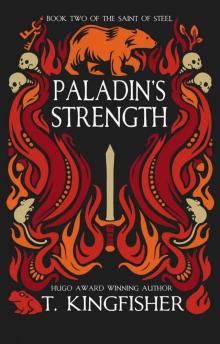 Paladin's Strength
Paladin's Strength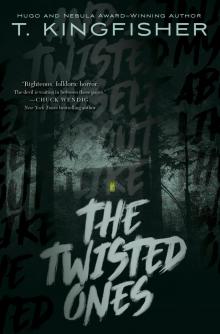 The Twisted Ones
The Twisted Ones The Hollow Places
The Hollow Places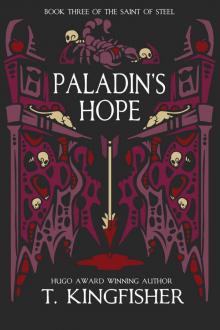 Paladin’s Hope: Book Three of the Saint of Steel
Paladin’s Hope: Book Three of the Saint of Steel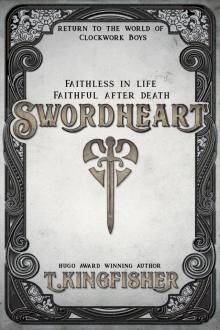 Swordheart
Swordheart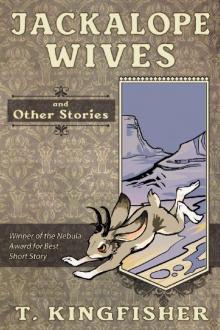 Jackalope Wives And Other Stories
Jackalope Wives And Other Stories A Wizard's Guide to Defensive Baking
A Wizard's Guide to Defensive Baking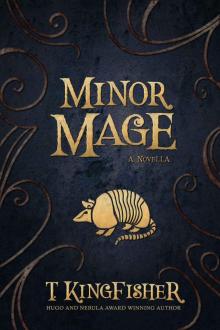 Minor Mage
Minor Mage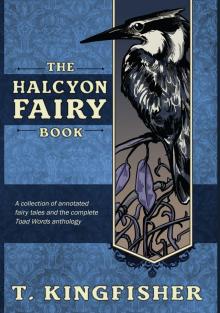 The Halcyon Fairy Book
The Halcyon Fairy Book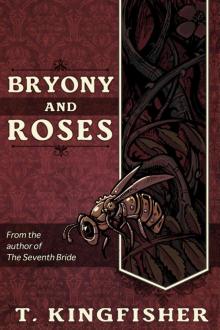 Bryony and Roses
Bryony and Roses The Wonder Engine_Book Two of the Clocktaur War
The Wonder Engine_Book Two of the Clocktaur War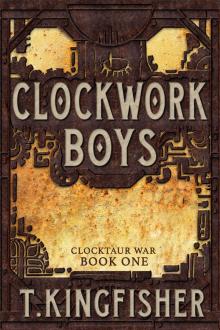 Clockwork Boys: Book One of the Clocktaur War
Clockwork Boys: Book One of the Clocktaur War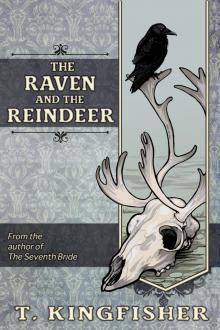 The Raven and the Reindeer
The Raven and the Reindeer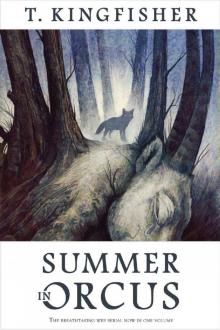 Summer in Orcus
Summer in Orcus The Wonder Engine
The Wonder Engine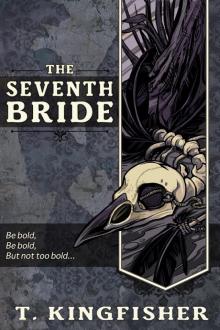 Seventh Bride
Seventh Bride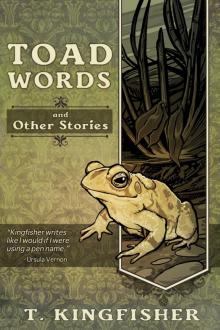 Toad Words
Toad Words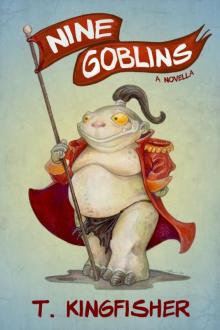 Nine Goblins
Nine Goblins